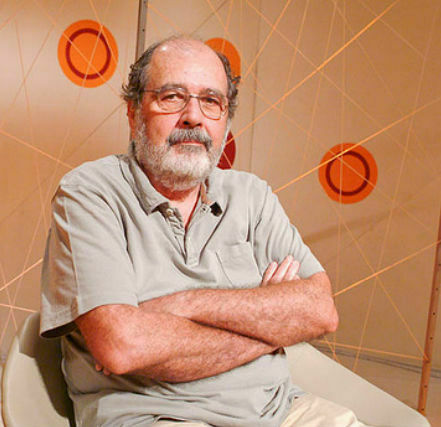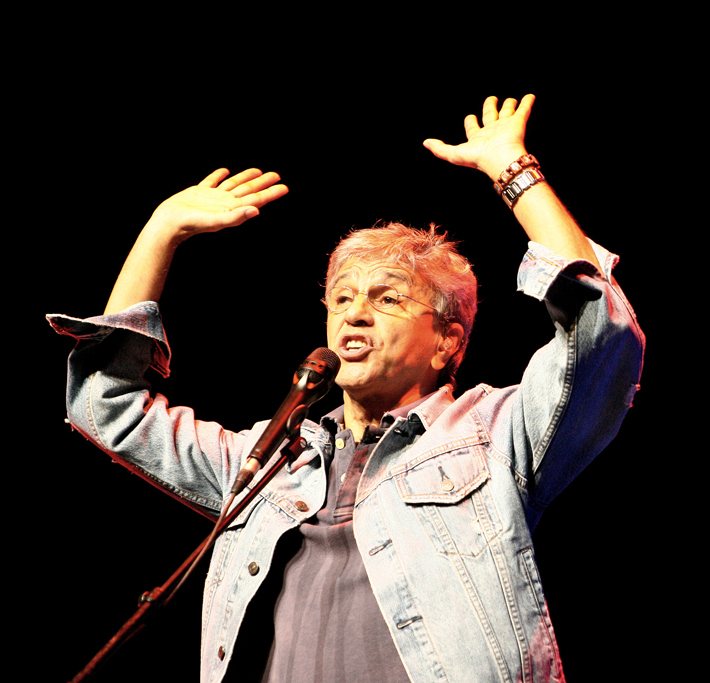|
1st Grande Prêmio Cinema Brasil
The 1st Grande Prêmio Cinema Brasil ceremony, presented by the Ministry of Culture (Brazil), Ministry of Culture of Brazil, honored the best audiovisual productions of 1999. It took place on February 12, 2000, at the Palácio Quitandinha in the city of Petrópolis, Rio de Janeiro (state), Rio de Janeiro. During the ceremony, the Ministry of Culture presented the Grande Prêmio Cinema Brasil in 17 categories. The ceremony, televised by TV Cultura and Televisão Educativa, was directed by José Possi Neto and hosted by actress Regina Casé. The film ''Midnight (1998 film), O Primeiro Dia'' (''Midnight'') was nominated for nine awards (the most of any film), followed by ''Orfeu'' with seven nominations. ''O Primeiro Dia'' and ''Orfeu'' tied for the most awards won, with three each. Other film winners included ''Nós que Aqui Estamos por Vós Esperamos'' with two awards, and ''Por Trás do Pano'', ''Outras Estórias'' and ''Dois Córregos'' with one each. Background After a decree ... [...More Info...] [...Related Items...] OR: [Wikipedia] [Google] [Baidu] |
Palácio Quitandinha
The Palácio Quitandinha is a historic former luxury resort hotel in Petrópolis, Rio de Janeiro (state), State of Rio de Janeiro, Brazil. In 1947, the Palácio Quitandinha was the site of the Inter-American Treaty of Reciprocal Assistance, Rio Treaty, attended by United States President Harry Truman. History Designed by Italian architect Luis Fossatti, and constructed between 1941 and 1946 by Brazilian entrepreneur Joaquim Rolla, the Palácio Quitandinha is one of the most impressive architectural monuments in Petrópolis. The exterior is in the Architecture of Normandy#Fin de siècle architecture in Normandy, Norman-French style, while the interior is a mix of Baroque in Brazil, Brazilian Baroque and Art Deco. The surface area of the hotel is 50 thousand square meters. It has six floors, with a 10 meter high ground floor. It has 440 rooms plus 13 suites with decor by Dorothy Draper.Life (1947)Life magazine p. 30, Time Inc, The hotel was, for many years, probably the second mos ... [...More Info...] [...Related Items...] OR: [Wikipedia] [Google] [Baidu] |
Universo Online
(Portuguese, 'Universe Online') (known by the acronym UOL) is a Brazilian web content, products and services company. It belongs to Grupo Folha enterprise. UOL is the world's largest Portuguese speaking portal, featuring more than 1,000 news sources and 7 million pages. The portal provides website hosting, data storage, publicity dealing, online payments and security systems. It also holds more than 300,000 online shops, 23 million buyers, and 4 million vendors in its portals. In 2012, UOL was the fifth most visited website in Brazil. According to Ibope Nielsen Online, UOL is Brazil's largest internet portal with more than 50 million unique visitors and 6.7 billion page views every month. History UOL was established by Grupo Folha on April 28, 1996. After seven months, UOL joined portal Brasil Online (BOL) from Editora Abril. However Editora Abril does not own shares in BOL anymore. Portugal Telecom had 29% of UOL, but sold its shares to Folhapar, a company controlled b ... [...More Info...] [...Related Items...] OR: [Wikipedia] [Google] [Baidu] |
Caetano Veloso
Caetano Emanuel Viana Teles Veloso (; born 7 August 1942) is a Brazilian composer, singer, guitarist, writer, and political activist. Veloso first became known for his participation in the Brazilian musical movement Tropicália, which encompassed theatre, poetry and music in the 1960s, at the beginning of the Military dictatorship in Brazil, Brazilian military dictatorship that 1964 Brazilian coup d'état, took power in 1964. He has remained a constant creative influence and best-selling performing artist and composer ever since. Veloso has won nineteen Brazilian Music Awards, nine Latin Grammy Awards and two Grammy Awards. On 14 November, Latin Grammy Awards of 2012, 2012, Veloso was honored as the Latin Recording Academy Person of the Year. Veloso was one of seven children born into the family of José Telles Veloso (commonly known as ''Seu Zeca''), a government official, and Dona Canô, Claudionor Viana Telles Veloso (known as ''Dona Canô''). He was born in the city of Sant ... [...More Info...] [...Related Items...] OR: [Wikipedia] [Google] [Baidu] |
Denise Fraga
Denise Rodrigues Fraga (born 15 October 1964) is a Brazilian actress. She is also a columnist at Editora Globo Editora Globo S.A. is a Brazilian publishing house, property of :pt:Fundação Roberto Marinho, Fundação Roberto Marinho. It began as a bookstore called Livraria do Globo, created in Porto Alegre, in December 1883, by Laudelino Pinheiro de Barc ...'s ''Crescer'' magazine. Filmography *'' Bambolê'' (1987) – Amália *''A, E, I, O, Urca'' (1990) *'' Barriga de Aluguel'' (1990) – Ritinha *'' Éramos Seis'' (1994) – Olga *'' Sangue do Meu Sangue'' (1995) – Natália *'' Cousin Bazilio'' (1998) – Natália *'' Por Trás do Pano'' (1999) – Helena *'' O Auto da Compadecida'' (2000) – Dora *'' Uga-Uga'' (2000) – Meg *'' Cristina Quer Casar'' (2003) – Cristina *'' The Sign of the City'' (2007) – Lydia *''Norma'' (2009) – Norma *''O Contador Histórias'' (2009) *'' As Melhores Coisas do Mundo'' (2010) – Camila *'' Hoje'' (2011) – Vera *'' A Lei do A ... [...More Info...] [...Related Items...] OR: [Wikipedia] [Google] [Baidu] |
Matheus Nachtergaele
Matheus Nachtergaele OMC (; born 3 January 1968) is a Brazilian actor, film director, and screenwriter. He has starred in numerous Brazilian films, best known for his appearances in the 1997 film '' Four Days in September'' and the 2002 film '' City of God,'' and is considered one of the most versatile Brazilian actors of his generation. Early life Matheus Nachtergaele was born on 3 January 1968 in São Paulo to an upper-middle-class, artistic family. His father, Jean-Pierre, was a jazz musician and his mother, Maria Cecília, was a poet who committed suicide when Matheus was only three months old. As a result, Matheus lived with his paternal grandparents’ early in his life between their farm in Atibaia and their beach house in Ubatuba. Matheus wouldn't learn about her mother's suicide until he was sixteen years old. In 2018, Matheus staged the monologue ''Concerto do Desejo'' (English: Concert of Desire), produced by him based on the poems written by his mother. According ... [...More Info...] [...Related Items...] OR: [Wikipedia] [Google] [Baidu] |
Walter Salles At TIFF 2012
Walter may refer to: People and fictional characters * Walter (name), including a list of people and fictional and mythical characters with the given name or surname * Little Walter, American blues harmonica player Marion Walter Jacobs (1930–1968) * Gunther (wrestler), Austrian professional wrestler and trainer Walter Hahn (born 1987), who previously wrestled as "Walter" * Walter, standard author abbreviation for Thomas Walter (botanist) ( – 1789) * "Agent Walter", an early codename of Josip Broz Tito * Walter, pseudonym of the anonymous writer of '' My Secret Life'' * Walter Plinge, British theatre pseudonym used when the original actor's name is unknown or not wished to be included * John Walter (businessman), Canadian business entrepreneur Companies * American Chocolate, later called Walter, an American automobile manufactured from 1902 to 1906 * Walter Energy, a metallurgical coal producer for the global steel industry * Walter Aircraft Engines, Czech manufacturer of aero ... [...More Info...] [...Related Items...] OR: [Wikipedia] [Google] [Baidu] |
O Estado De S
O, or o, is the fifteenth Letter (alphabet), letter and the fourth vowel letter of the Latin alphabet, used in the English alphabet, modern English alphabet, the alphabets of other western European languages and others worldwide. Its name in English is English alphabet#Letter names, ''o'' (pronounced ), plural English alphabet#Letter names, ''oes''. Name In English, the name of the letter is the "long O" sound, pronounced . In most other languages, its name matches the letter's pronunciation in open syllables. History Its graphic form has remained fairly constant from Phoenician alphabet, Phoenician times until today. The name of the Phoenician letter was ''Ayin, ʿeyn'', meaning "eye", and its shape originates simply as a drawing of a human eye (possibly inspired by the corresponding Egyptian hieroglyphs, Egyptian hieroglyph, Proto-Sinaitic script). Its original sound value was that of a consonant, probably , the sound represented by the cognate Arabic alphabet, Arabi ... [...More Info...] [...Related Items...] OR: [Wikipedia] [Google] [Baidu] |
Brasília
Brasília ( ; ) is the capital city, capital of Brazil and Federal District (Brazil), Federal District. Located in the Brazilian highlands in the country's Central-West Region, Brazil, Central-West region, it was founded by President Juscelino Kubitschek on 21 April 1960, to replace Rio de Janeiro as the national capital. Brasília is Brazil's List of cities in Brazil by population, third-most populous city after São Paulo and Rio de Janeiro, with a population of 2.8 million. Among major Latin American cities, it has the highest GDP per capita. Brasília is a Planned community, planned city developed by Lúcio Costa, Oscar Niemeyer and Joaquim Cardozo in 1956 in a scheme to move the capital from Rio de Janeiro to a more central location. The landscape architect was Roberto Burle Marx. The city's design divides it into numbered blocks as well as sectors for specified activities, such as the Hotel Sector, the Banking Sector, and the Embassy Sector. Brasília was inscribed as a UN ... [...More Info...] [...Related Items...] OR: [Wikipedia] [Google] [Baidu] |
Joaquim Pedro De Andrade
Joaquim Pedro de Andrade (May 25, 1932 – September 10, 1988) was a Brazilian film director and screenwriter. He was a member of the Cinema Novo movement in Brazil. Andrade is best known for his 1969 film ''Macunaíma (film), Macunaíma'', based loosely on the novel of the same title by Mário de Andrade. His 1962 documentary film ''Garrincha: Hero of the Jungle'' was entered into the 13th Berlin International Film Festival. Filmography References Bibliography * :fr:Patrice_Kirchhofer, Patrice Kirchhofer, « ''Film saboté'' de Pedro De Andrade » (2001) in :fr:Nicole_Brenez, Nicole Brenez, :fr:Christian_Lebrat, Christian Lebrat (codir.), ''Jeune, dure et pure ! Une histoire du cinéma d’avant-garde et expérimental en France,'' Paris/Milan, Cinémathèque française/Mazzotta, 2001, p. 269 (:fr:International_Standard_Book_Number, ISBN :fr:Spécial:Ouvrages_de_référence/2-900596-30-0, 2-900596-30-0) External links * 1932 births 1988 deaths 20th-century Bra ... [...More Info...] [...Related Items...] OR: [Wikipedia] [Google] [Baidu] |
Anselmo Duarte
Anselmo Duarte Bento (; 21 April 1920 – 7 November 2009) was a Brazilian actor, screenwriter and film director. Early life Duarte was born in Salto, São Paulo on 21 April 1920. He was raised by his mother, alongside his six siblings. Career His 1962 film '' O Pagador de Promessas''—''Keeper of Promises''—was awarded the Golden Palm at the 1962 Cannes Film Festival, becoming, to date, the only Brazilian feature film to be distinguished this way and the first winner from the Southern Hemisphere. The film was also nominated for the Academy Award for Best Foreign Language Film. Furthermore, ''O Pagador de Promessas'' won awards for Best Film and Best Musical Score at the San Francisco International Film Festival and for Best Film at the Acapulco Film Festival, the Cartagena Film Festival, the Karlovy Vary International Film Festival and the Edinburgh International Film Festival in 1962. His 1964 film ''Vereda da Salvação''—'' The Obsessed of Catule''—was ... [...More Info...] [...Related Items...] OR: [Wikipedia] [Google] [Baidu] |
Zezé Motta
Maria José Motta de Oliveira (born 27 June 1944), known as Zezé Motta, is a Brazilian actress and singer. She is considered one of the most important actresses in Brazil. Life and career Born in Campos dos Goytacazes, she moved with her family to Rio de Janeiro at the age of two. She attended the school of Tablado Theatre and began her acting career in 1966, starring in the play ''Roda-viva'', by Chico Buarque. Other plays she worked in include ''Arena Conta Zumbi'' (1969), ''Orfeu Negro'' (1972), and ''Godspell'' (1974) She began her singing career in 1971 in the nightclubs of São Paulo. Between 1975 and 1979, she released three LPs, and a further three albums in the 1980s. In 1976, she starred in the film '' Xica da Silva''. Over the decades she has acted in some of the most popular television soap operas and series. Discography # ''Gerson Conrad & Zezé Motta'' (1974) LP/CD # ''Zezé Motta (Prazer, Zezé)'' (1978) LP/CD # ''Negritude'' (1979) LP/CD # ''Anunciação / Neg ... [...More Info...] [...Related Items...] OR: [Wikipedia] [Google] [Baidu] |



